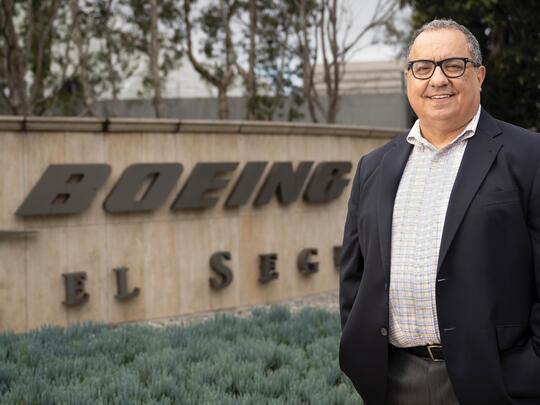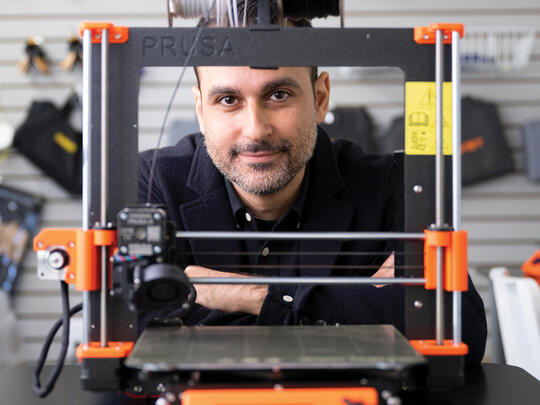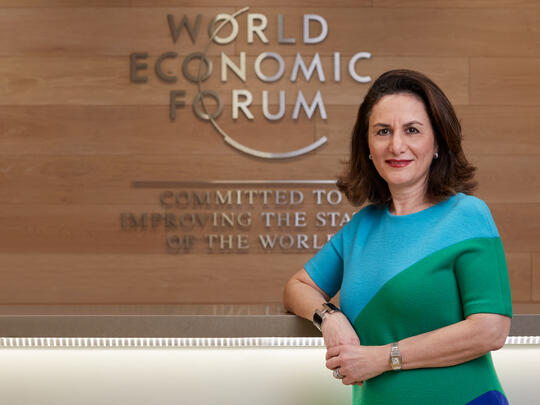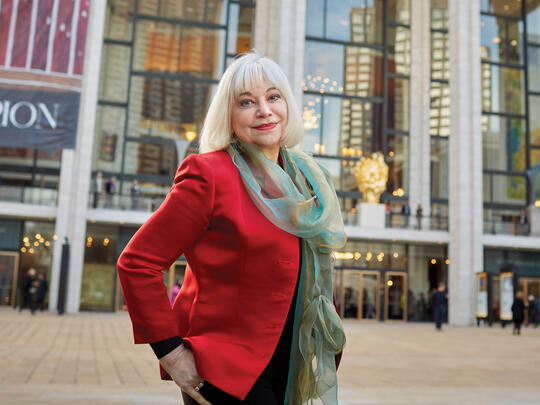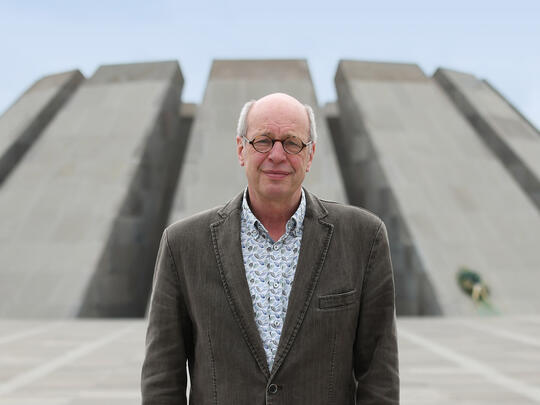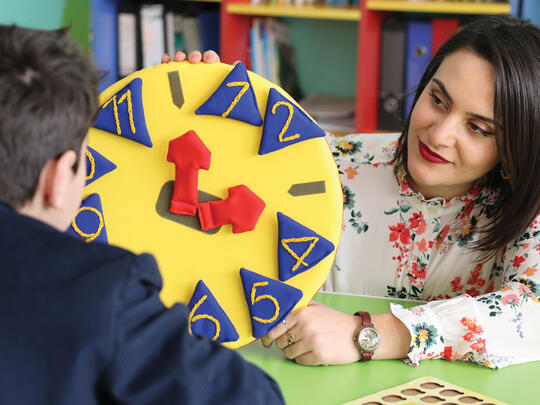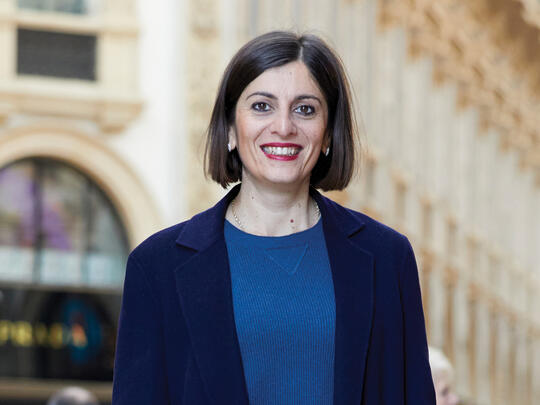As a young girl, Maral Kazanjian always knew she wanted to empower women in some shape or form, inspired by power-house leaders like Coco Chanel and Jacqueline Kennedy Onassis. Fast-forward to 2023, the lawyer, mother, Sunday Schoolteacher, and Chief People Officer at Moody’s Corporation is center stage at AGBU’s Women Shaping The World Conference in New York City as a panelist, sharing the incredible story of her encounter with Malala Yousafzai, the renowned Pakistani education activist and Nobel Peace Prize winner who made headlines for surviving an assassination attempt. Both bonded over their belief in knowing their self-worth—motivating them to be the drivers of their destiny.
“Her conviction in life is that you don’t have to speak very loudly if you speak with a lot of strength and know your value,” she imparted to the ardent audience. “Every day she walks around knowing her value—and hearing a 25-year-old tell me that she knows her value and that’s how she proceeds through life, my hope is that it can inspire others to also proceed through life knowing their value.” Although she recently had this fateful encounter, Kazanjian has always been guided by this conviction to speak up for the silenced. Spending her formative years in Bergen County, New Jersey, the AGBU Camp Nubar alumna strongly identified with Lebanese-Armenian and Iranian-Armenian roots, citing this identity as one of her greatest assets. Growing up as a voracious reader, Kazanjian was inspired by the stories of resilient female leaders and knew this would play a part in her career somehow. “I was very passionate about the stories that we tell about women, and how women show up in history, and the evolving definition of femininity,” she says, sharing Ruth Bader Ginsburg’s journey as one of her biggest inspirations.
“I wanted to be part of that journey of supporting and promoting equality for women because I felt like the stories we told were not equal. And it was so clear that women had a particular place that they belonged—and it felt like it was harder to be able to not conform to that one place.” She adds: “I wanted to be part of building the narrative of women having the opportunity to be more expansive than that.”
It was a natural progression, then, for her to find her path as a lawyer, graduating from Georgetown University, then Rutgers School of Law, and interning for Justice Samuel Alito, an associate justice of the Supreme Court of the United States. During her time at Georgetown, the advocate started a hotline with her friend for women on campus dealing with a lack of safety, mental health crises, and sexual assault. “This was my first foray into what it meant to be a leader and take action and just do something,” she says. “Even if it has a minimal impact, just try and do something and care enough about the outcome.” Kazanjian later joined a pre-eminent international law firm, a move motivated by her passion for women’s rights and equality.
The firm, Morgan, Lewis & Bockius LLP, has an acclaimed Labor & Employment law practice where Kazanjian specialized in employment litigation, which piqued her interest in tackling systemic issues including inequality. “After about nine years of litigating, however, I realized the challenge with being a lawyer when you’re an outside litigator is you’re walking into problems after they’ve already blown up and you’re cleaning up what someone else created.”

“I realized along the way, if one person in any situation had just done this one thing differently, maybe something bad wouldn’t have happened,” she shared with AGBU. This sparked her decision to make a profound change and work at a corporation. “Rather than cleaning up a mess, I’d rather be part of preventing the problem as it’s arising.” The lawyer took on a job at Moody’s Corporation, counseling employers on what it means to be a truly great place to work.
Moody’s Corporation, often referred to as Moody’s, is a global integrated risk assessment firm that empowers organizations to make better decisions. Comprised of Moody’s Investors Service, the venerated credit ratings agency, and Moody’s Analytics, it is a leading provider in data, analytics and insights to equip leaders of financial, non-financial and government organizations with effective tools to understand a range of risks. The titan traces its history back to the1900s, and through the years, as risks evolved, Moody’s has expanded its assessment capabilities in areas such as sustainability and climate change, cyber, insurance, local market credit ratings and Know Your Customer (KYC) services.
After many years as a legal counselor at Moody’s, however, Kazanjian recognized she could make a deeper impact if she could help shape company-wide employee policies proactively instead of managing issues reactively. “The only way to do that,” she realized, “was to move from legal to human resources.” She describes her next steps from the legal world to human resources as manifestation, a practice she swears by. Evidently, the universe listened, and one fateful day, she received a call from a large, well-known corporation to join their people leadership team.
I wanted to be part of that journey of supporting and promoting equality for women because I felt like the stories we told were not equal.
This company she mentions ever so casually is WeWork, a household name synonymous with coworking spaces and celebrity CEOs. The company’s rise and fall are infamous, earning itself a Hulu documentary and an Apple TV+ show starring Anne Hathaway and Jared Leto called “We Crashed.” Kazanjian has binged the dramatic portrayal, saying that watching it back is surreal. “I will never forget the experience, but I look back on it with so much gratitude because if I didn’t do that, I wouldn’t be qualified or equipped to do what I’m doing today.”
Kazanjian was there every step of the way for the highly public ups and downs of the company, from the pre-IPO excitement to the dramatic withdrawal of the IPO to WeWork’s second chapter as a humbler and more focused coworking company. Following mounting pressure from investors in 2019, Internet personality and company co-founder Adam Neumann resigned from his position as CEO and gave up majority voting control in WeWork.“It was a really hard time for the company, but it was a wonderful time to learn all the aspects of what it means to run a really good people function. And I got to work alongside brilliant, brilliant people.”
She candidly shares that this was an extremely difficult chapter in her life. “It wasn’t easy and it wasn’t pretty, but I think we at least made a little bit of a difference for some people. And that was really important.” Her family kept her focused, she claims, citing them as her spark to keep going. Her daughter Carina popped into the Zoom call, lighting up Kazanjian’s face. “You just met one of the two most important things in my life. I always say between my kids and my parents and my husband, those are my center.”

Manifestation kicked in again with another opportunity knocking at Kazanjian’s door. She received a call from Rob Fauber, the President and CEO of Moody’s, to rejoin the team, this time as the Chief People Officer to lead their people and real estate function—which initially gave her Imposter Syndrome. She remembers asking herself, “Who am I to be a person that’s sitting beside this visionary and intelligent leader driving the trajectory of one of the world’s great companies?” However, her experience at WeWork gave her courage to take on this opportunity and rejoin a team she loved.
Kazanjian is tasked with asking the tough, but timely, questions on everyone’s mind to build a better work environment at a pivotal moment in time. “I ask everything from what talent do we need to serve our great purpose to what should our policies look like? How many days should people come into the office? What is the office in the world where you’re across a hundred cities and a third of your population works at home and what should our real estate footprint look like?” She summarizes her most important question as helping employees figure out their best growth path to finding their purpose and asking how to connect this purpose to the best way to improve the communities we serve. “My mission is to enable our people to deliver that vision to the world. And my job is to enhance, through people, our delivery of that vision.
After more than a year in this position, it is evident her experience and drive have resulted in an award-winning work environment. She has facilitated conversations from fertility support and career development to fair compensation and meaningful employee recognition. In 2022, under Maral’s leadership, Moody’s was named for the third consecutive year to Diversity Inc.’s Top 50 Companies for Diversity. Additionally, Seramount highlighted Moody’s as a Pinnacle Inclusion Index Company for superior achievement in diversity, equity, and inclusion. Moody’s also achieved Great Place to Work certifications in the U.S. and India.
This list considers a wide swath of issues, from fair wages and customer privacy to the reduction of carbon emissions. This overall satisfaction, it seems, wouldn’t be possible without Kazanjian’s eagle-eyed and thoughtful leadership of human resources at the company. “At the end of the day, my job is to make people feel like they’re at a special place at a special time.”


